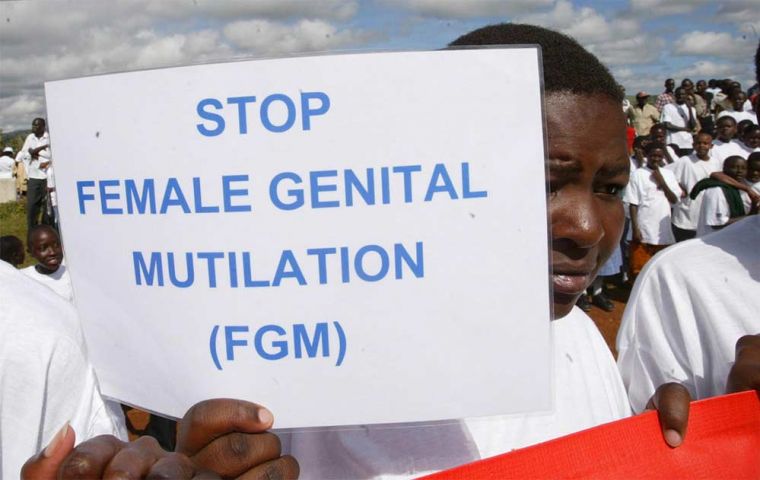MercoPress. South Atlantic News Agency
UN warns 4.3 million girls at risk of genital mutilation
 FGM “is one of the most vicious manifestations of the patriarchy that permeates our world,” Guterres said
FGM “is one of the most vicious manifestations of the patriarchy that permeates our world,” Guterres said United Nations Secretary-General António Guterres Tuesday warned that some 4.3 million girls worldwide were at risk of being subjected to a Female Genital Mutilation procedure and insisted that eliminating such a practice should be likened to other goals mankind needs to attain by 2030.
“We must invest and take urgent action to achieve the Sustainable Development Agenda goal of eliminating female genital mutilation by 2030,” Guterres warned in a statement. He also underlined that one in four women who underwent the practice - some 52 million worldwide - did so by a licensed healthcare professional at a legal medical center, which showed an increase in the prescription of FGM by physicians. “All procedures involving the alteration or injury of female genitalia for non-medical reasons are internationally recognized as a violation of the human rights, health, and integrity of girls and women,” he went on. FGM is an “act of gender-based violence,” he added.
Guterres also recalled that “brothers, fathers, health workers, teachers, and traditional leaders can be powerful allies against this scourge.”
“I call on you around the world to join me in raising your voice and taking a stand against female genital mutilation,” for the benefit of all,” he insisted.
The practice is most common in about 30 countries in Africa, the Middle East, and South Asia, as well as some Asian countries (India, Indonesia, Iraq, and Pakistan) and some small communities in Latin America, according to the UN.
In African countries such as Eritrea, Ethiopia, Guinea, and Sudan, significant percentages of men and boys oppose female genital mutilation. However, the practice persists in many of the migrant populations living in Western Europe, North America, Australia, and New Zealand. Over the past 25 years, the prevalence of FGM has declined worldwide, according to the UN. Today, a girl is one-third less likely to undergo it than she was 30 years ago, the UN also said.
Humanitarian crises such as disease outbreaks, climate change, and armed conflict, among others, could jeopardize the maintenance of these achievements and consequently set back progress towards achieving gender equality and an end to female genital mutilation by 2030, according to the UN.
Guterres underscored that genital cutting causes lifelong damage to both the physical and mental health of women and girls. “It is one of the most vicious manifestations of the patriarchy that permeates our world,” Guterres stressed. He added that the practice was “rooted in the same gender inequalities and complex social norms that limit women’s participation and leadership and restrict their access to education and employment. “This discrimination damages the whole of society, and we need urgent action by the whole of society to end it.”
As part of that, the UN sexual and reproductive health agency UNFPA is partnering this year with UN Children’s Fund UNICEF on eliminating FGM in a campaign themed, Partnership with Men and Boys to transform Social and gender Norms to End FGM. The agencies are calling for the international community to foster male engagement on just how harmful FGM is and uplift the voices of women and girls. The UNFPA and UNICEF joint program to accelerate the elimination of FGM has been running since 2008, and focuses on 17 countries in Africa and the Middle East, and also supports regional and global initiatives.
The International Day for Zero Tolerance of Female Genital Mutilation and Cutting was celebrated on Feb. 6




Top Comments
Disclaimer & comment rulesCommenting for this story is now closed.
If you have a Facebook account, become a fan and comment on our Facebook Page!